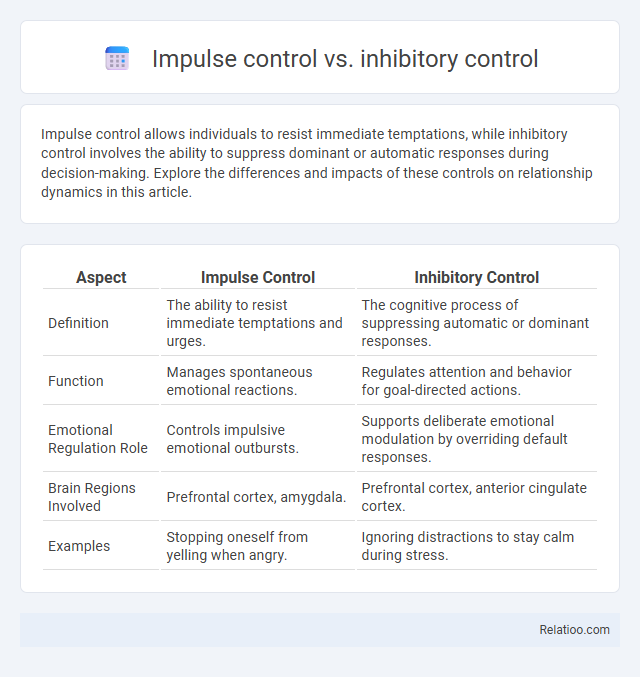Impulse control allows individuals to resist immediate temptations, while inhibitory control involves the ability to suppress dominant or automatic responses during decision-making. Explore the differences and impacts of these controls on relationship dynamics in this article.
Table of Comparison
| Aspect | Impulse Control | Inhibitory Control |
|---|---|---|
| Definition | The ability to resist immediate temptations and urges. | The cognitive process of suppressing automatic or dominant responses. |
| Function | Manages spontaneous emotional reactions. | Regulates attention and behavior for goal-directed actions. |
| Emotional Regulation Role | Controls impulsive emotional outbursts. | Supports deliberate emotional modulation by overriding default responses. |
| Brain Regions Involved | Prefrontal cortex, amygdala. | Prefrontal cortex, anterior cingulate cortex. |
| Examples | Stopping oneself from yelling when angry. | Ignoring distractions to stay calm during stress. |
Introduction to Impulse Control and Inhibitory Control
Impulse control refers to the ability to resist immediate temptations or urges in order to achieve long-term goals, playing a crucial role in decision-making and self-regulation. Inhibitory control is a specific cognitive process within executive functions that involves suppressing automatic, dominant, or prepotent responses to enable goal-directed behavior. Understanding the distinction highlights that inhibitory control serves as the underlying mechanism that facilitates effective impulse control in various behavioral and psychological contexts.
Defining Impulse Control
Impulse control refers to the ability to resist or delay immediate temptations and urges in order to achieve long-term goals, playing a critical role in decision-making and self-regulation. Inhibitory control is a broader executive function that involves suppressing automatic or dominant responses, encompassing impulse control but also including other forms of cognitive suppression. Understanding Your impulse control helps improve emotional regulation, reduce impulsive behaviors, and enhance overall mental health.
Understanding Inhibitory Control
Inhibitory control is a crucial executive function that enables Your ability to suppress automatic or dominant responses to stimuli, helping manage impulsive actions and maintain focus. Unlike impulse control, which deals with resisting immediate temptations, inhibitory control involves actively controlling attention and behavior to prevent inappropriate reactions. Understanding inhibitory control can enhance self-regulation skills and improve decision-making in complex environments.
Key Differences Between Impulse and Inhibitory Control
Impulse control refers to the ability to resist immediate temptations or urges, while inhibitory control is a broader cognitive function that involves suppressing prepotent or automatic responses to stimuli. The key difference lies in inhibitory control encompassing a wider range of self-regulatory processes, including attention regulation and response inhibition, whereas impulse control specifically targets the suppression of impulsive behaviors. Both are critical components of executive function but serve distinct roles in behavior regulation and decision-making.
The Neuroscience Behind Self-Control Mechanisms
Impulse control, inhibitory control, and self-control involve distinct neural circuits primarily in the prefrontal cortex, including the dorsolateral prefrontal cortex and anterior cingulate cortex. Neuroscience research highlights the role of neurotransmitters such as dopamine and serotonin in modulating these control mechanisms, influencing decision-making and behavioral regulation. Functional MRI studies reveal that deficits in these areas correlate with impaired self-regulation seen in disorders like ADHD and substance abuse.
Impulse Control Disorders: Causes and Implications
Impulse control involves the ability to resist urges and delay gratification, whereas inhibitory control specifically refers to suppressing automatic or dominant responses. Impulse Control Disorders (ICDs) arise from disruptions in these cognitive processes, often linked to neurobiological factors such as dopamine dysregulation and prefrontal cortex dysfunction. Understanding these causes is crucial for managing your behaviors and minimizing the significant social, emotional, and psychiatric implications associated with ICDs.
The Role of Inhibitory Control in Everyday Life
Inhibitory control is a critical aspect of executive function that enables you to suppress automatic or impulsive responses to stimuli, facilitating goal-directed behavior in everyday life. Unlike impulse control, which broadly encompasses resisting urges, inhibitory control specifically regulates attention and behavior by filtering distractions and preventing inappropriate actions. This cognitive skill supports decision-making, emotional regulation, and social interactions, enhancing your ability to navigate complex environments effectively.
Strategies to Improve Impulse and Inhibitory Control
Improving impulse and inhibitory control involves practicing mindfulness techniques, such as deep breathing and self-monitoring, to enhance your ability to pause before reacting. Cognitive-behavioral strategies, including goal setting and delayed gratification exercises, strengthen neural pathways responsible for self-regulation and decision-making. Consistent training in these areas increases your capacity to manage spontaneous urges and resist distractions effectively.
Impulse vs Inhibitory Control: Real-World Examples
Impulse control and inhibitory control both involve regulating behavior, but impulse control refers specifically to resisting immediate temptations or urges, while inhibitory control is the broader ability to suppress dominant or automatic responses. For example, impulse control is demonstrated when someone avoids eating junk food despite cravings, whereas inhibitory control occurs when a driver stops themselves from reacting aggressively in heavy traffic. Real-world scenarios often show these functions overlap, such as a student resisting the impulse to check their phone (impulse control) by overriding habitual multitasking behavior (inhibitory control).
Future Research and Developments in Self-Regulation
Future research on impulse control, inhibitory control, and self-regulation emphasizes identifying neural mechanisms and genetic influences that differentiate these constructs for tailored interventions. Advances in neuroimaging and machine learning are expected to refine assessments and predictive models, enhancing personalized behavioral therapies. Emerging developments also aim to integrate digital health technologies and real-time biofeedback to improve the efficacy and accessibility of self-regulation training programs.

Infographic: Impulse control vs Inhibitory control
 relatioo.com
relatioo.com